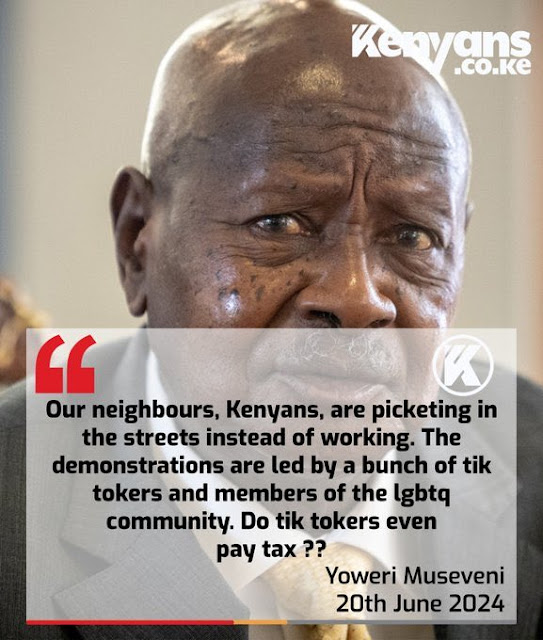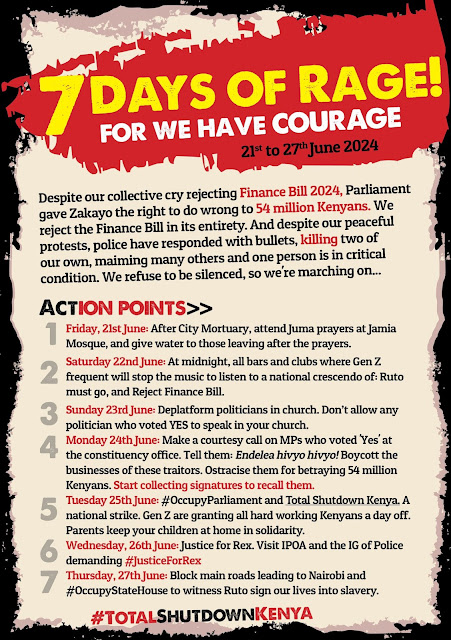.jpeg)
As the sun rises over Kenya today, a storm will be brewing within its borders.
The Finance Bill 2024, spearheaded by President William Ruto, has sparked unprecedented nationwide protests. The youth, in particular, have risen in defiance, challenging the bill’s draconic and bizarre provisions that threaten to reshape land ownership and exacerbate economic hardships, among myriad evils. This rebellion is not just a cry for justice; it is a battle for the very soul of the nation.
A Revolt in the Sanctuaries: Nyahururu's Impending ShowdownToday, President William Ruto is scheduled to attend a church service at the ACK Nyahururu Diocese.
This visit, however, is set against a backdrop of youthful anti-finance bill protesters who have vowed to disrupt the proceedings. Messages have already been sent to the church leadership, warning them against allowing politicians who supported the Finance Bill 2024 to speak. This act of defiance is part of a broader strategy to reclaim the sanctity of religious spaces from political exploitation.
The People's Court: Politicians Face Public Wrath
The fury against the Finance Bill 2024 has spilled into every corner of Kenya.
In Nairobi, Sports CS Ababu Namwamba was on Friday night jeered at a comedy concert at Carnivore, while in Mombasa, Lamu East lawmaker Ruwayda Muhammad was ejected from a public meeting.
This unrest has also seen MPs and cabinet members confronted in their constituencies.In Lodwar, Turkana Central MP Joseph Namuar had to cut short his speech amidst boos. The message from the people is unambiguous: they will no longer tolerate betrayal.
A Government in Denial: Dismissing Genuine Grievances
The government's response to the protests has been dismissive, labelling the movement as "middle-class agitation with no real understanding of hardship." This narrative, however, is increasingly being seen as out of touch with reality. Veteran journalist Macharia Gaitho criticised the government's stance, highlighting the broad-based nature of the discontent. "These are people who are not aligned to any political party. They're not loyal to any of our ethnic leaders. It is tribeless, it is faceless, it is party-less," he stated, underscoring the organic nature of the revolt.Gaitho's observations point to a critical miscalculation by the Ruto administration. The protests are not the product of elite machinations but a genuine outpouring of frustration from Kenyans across social and economic strata. The Finance Bill 2024, with its onerous tax provisions and sweeping changes to land ownership, is seen as a catalyst for this widespread dissent.Digital Revolt: The X-Space Uprising The digital realm has become a powerful arena for mobilising resistance.
Yesterday's record-breaking 10-hour X-Space conversation about the arrest of influential digital personalities, including Billy Simani, drew over 50,000 participants. The discussion, led by influencers Amerix and Osama Otero, criticised the government and police for their heavy-handed tactics.
Transport CS Kipchumba Murkomen and Senator Aaron Cheruiyot faced a relentless grilling from participants demanding the release of the detained activists. Conspicuously tuned in and quietly listening was President William Ruto, who quickly got out of Dodge when the heat became unbearable for his factotums whose feet were being held to the fire.
The digital mobilisation extends beyond mere conversation. It is a call to action, rallying Kenyans to participate in next week's #7DaysOfRage demonstrations. This online rebellion has proven resilient and impactful, demonstrating the power of social media in amplifying the voices of dissent.The Hidden Dangers of Finance Bill 2024: A Land Grab in Disguise
Succession planning becomes fraught with uncertainty, and corrupt officials are certain to exploit lease renewals to grab coveted land. The fear is that this move is part of Ruto's broader ambition to surpass the Kenyatta family's legendary land holdings, further entrenching a new political dynasty.
The irony!
A Nation's Call to Action
The #7DaysOfRage, culminating in the planned occupation of State House on Thursday 27th June, represents the pinnacle of this defiance.
In this defining moment, the youth of Kenya have risen. They are reclaiming their country, their future, and their land. The Finance Bill 2024 is not just legislation; it is a line in the sand. The battle for Kenya's soul has begun, and the world watches as a new chapter in the nation's history unfolds.
.jpeg)
.jpeg)







Comments
Post a Comment